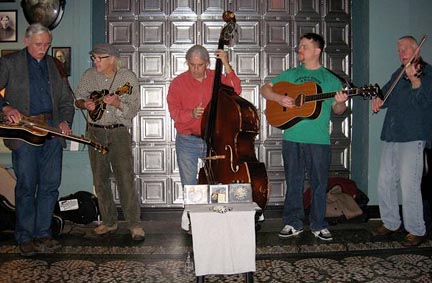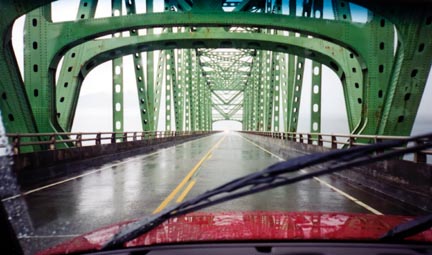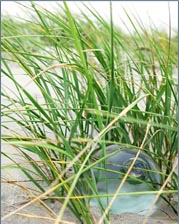by
Joan Marie

Back in December, as everyone was hunkering down and trying to stay
warm, dry and off the snowy passes, the members of the Floating Glass
Balls were traveling back and forth to a Portland studio, laying down
the tracks for their third CD, "Winter
in Paradise."
"We
picked the snowiest time in the history of Portland to record this
CD," said Peter "Spud" Siegel, reflecting on the group's
time in the studio during the two consecutive snowy weekends in late
December. The combination of the wintery weather, and a line in one
of the songs, written by fellow member Joel Marshall, "Dank,
Dark and Dismal" and the title of the CD was born -- "Winter
in Paradise."
The Floating
Glass Balls are well-known in Cannon Beach and can be found playing
weekly at Bill's Tavern on Thursday nights. Thursday, April 2 at Bill's
is the kickoff of multiple release parties scheduled for "Winter
in Paradise." The group will also perform from 7 to 9 p.m. Friday,
April 4 at The Lumberyard in Cannon Beach and beginning at 8 p.m.
Saturday, April 5 at Fort George in Astoria.
Their
music is broad and pulls from many genres -- bluegrass, Caribbean,
contemporary, country, and swing tunes-- the likes of the Stanley
Brothers and the Carter Family, to name just a couple. It is reflected
in what each member brings to the table. Together now for 10 years,
"The Balls" can easily play four to five straight gigs without
repeating a song -- a testament to the depth the group has developed
throughout those years playing together.
Their
last CD "Ashore" was released in 2005.
"Winter
in Paradise" has 19 tracks and includes the most original pieces
the group has placed on any of their CDs. As a matter of fact, you
can find The Balls featured via the Internet on YouTube,
capturing their recording of "The
Guns of Fort Stevens," an original piece written specifically
for this CD by Dan Conner, who plays the Dobro.
Conner
said, "I'm looking forward to this CD -- it is our most original
work so far on any of our CDs." His other contributions included
two instrumentals, "Sidewinder,"
written while visiting Weiser, Idaho during a National Fiddler's Contest,
and "Wood Rat,"
a piece named by Joel Marshall, The Ball's guitar player.
Gar Keiski,
who fiddles and wrote, "Love
Comes to Call" some 15 years ago, pulled it out of the archives
to record on this CD. He said, "Original material is really important
because it's nobody else's." And, in reference to recording being
important, but secondary, "I enjoy the live performances. We've
had good compliments from people about our performances." And,
he added, "This CD is a good representation of what we sound
like live."
"I
am pleased to play with people who give it the attention to quality
for a live performance -- paying attention, and listening to each
other," Keiski said.
Spud,
the group's mandolin player, contributed three original pieces --
an instrumental titled "Pumpkin
Puss," "Finish
Line," written some time ago, and "Peace
for All the People," a song composed about two years ago
in a train station while traveling through Croatia with Marshall.
In addition
to "Dank, Dark, and Dismal," Marshall's experience of 14
winters here on the coast, he contributed "Shane." This
song chronicles the life of his friend as he moves through his daily
routine as a landscaper in the Cannon Beach area.
Bill
Uhlig, who plays bass but does not sing, said, "I am very fortunate
to play with great people." In fact, he sometimes gets so caught
up in listening and watching Siegel's playing, that he has to remember
to jump into the song for his part.
Uhlig
worked on coordinating the graphics for "Winter in Paradise."
He shared that Roger McKay, an Astoria artist, provided the artwork
illustrating the CD's cover of floating glass balls and broken instruments
moving down and out to sea. "The elements just came together,"
he said.
Talking
about the release of "Winter in Paradise," Uhlig said, "It
works for us. It is a chronicle of our crop of original songs, and
it has been a fun project."
He also
reflected that there is more freedom, tools, and resources to play
and record music today, whether is is on the coast, in Portland, or
anywhere.
"American
music is alive and well," he said.
"Winter
in Paradise" was produced using analog versus digital technology.
There was no opportunity to go back, pick the tracks apart and make
digital enhancements. The playing, the creativity, spontaneity and,
most importantly, the passion of each person creates the Floating
Glass Balls.
There
is excitement in the future for The Balls as they launch "Winter
in Paradise" and set their sight on playing as much as possible
up and down the coast the rest of this year. Soon anyone will be able
to download their songs directly from their web site.
"It's
good," said Siegel on the completion and release of "Winter
in Paradise," "and long overdue. We should have recorded
a year or two ago."
You can
catch the Floating Glass Balls' updated schedule
on their web site at floatingglassballs.com.
hipfish
January 2006
by
Jenny Gamroth

Certain things remind us we're alive: a laugh, a brief and immediate
connection with a stranger, witnessing live music unfold before our
very eyes. Live music can really stick to the ribs, uplift or make
us weep, cause us to sit in rapture or pull us out onto dance floors.
So when given an opportunity to experience truly live music (instead
of wincing to your neighbor's karaoke-rendition of Love Shack
or King of the Road), I strongly suggest you take it.
It's
especially fun to attend a show of a group that has a following. You're
guaranteed to be mixed in with folks thrilled to be there. At Kernville
Steak and Seafood house (just south of Lincoln City, along the central
Oregon coast), I met such a group of men last spring: Floating Glass
Balls.
The name
may not work well on a marquis, as bassist Bill Uhlig was quick to
point out. In fact, not one of the five would admit to coming up with
it. But it stuck and is perfectly suited for their folksy, traditional,
bluegrassy... well, beachgrassy sound. Ask anyone along the north
coast where you can catch The Balls and they'll point you to Bill's
Tavern in Cannon Beach, where they perform every Thursday night. Each
of the band's five members has played there, together or individually,
for years. Mandolin player Peter Siegel has since 1977, when Bill's
hosted a weekly open jam. Over the years Bill's remodeled and became
a little more refined, wanting an actual band. Hence, Floating Glass
Balls.
Peter
Siegel ('Spud') met the others in turn playing at one spot or another.
First there was dobro player Dan Conner at a jam session at Spud's
brother's house 20 years ago. A retired army colonel and engineer,
Dan is a combination of West Point grad and life-long bluegrass fan.
A man of few words, but a glance from Dan speaks volumes. Next came
Uhlig. Bill and Spud have played together in coastal staple Bond Street
Blues Band since 1989. To watch Bill play is a joy. He typically has
his eyes closed and a peaceful smile on his face, looking as though
dancing with his favorite partner. Between beats he'll suddenly let
go of his instrument and grab it up again with an accented thump.
Then there was fiddler Gary Keiski, who was introduced to Spud through
guest washboard player Billy Hults. The three of them were roommates
for a time in the early '90s. Gary is a kind- hearted fellow with
a pleasant smile and a non-judging nod for anyone. Lastly, we have
the band's youngest member, the group's practical joker, guitarist
Joel Marshall. He watched the others play at Bill's and at the American
Legion Hall in Cannon Beach about 6 or 7 years ago. He sings most
of The Balls songs. He may be the youngest, but his band mates say
he is extremely responsible and wise beyond his years. These prolific
fellows have been playing together as a band for three years now.
To watch
them, you'd imagine they weren't thinking about what they were playing
at all; their movements seem unconscious as all good musicians do.
Something about their music makes one willing to be chatty with the
person sitting nearby. In fact, the last time I was at Bill's, the
man sitting next to me couldn't wait to share his Balls enthusiasm
with me. This man comes from Sisters every year to write his Christmas
cards and have an extended stay in Cannon Beach. When he is at the
coast, he is a Thursday night regular for music he says reminds him
of small clubs in Tahiti and Greece. It is great fun being part of
the comraderie this band inspires. At the same time they are so good
I am tempted to ask my neighbors to stop talking just so they don't
miss anything.
One night
I asked Gary why he keeps playing with these guys and he told me,
"Cuz they let me keep trying to get the style right and it's
just too much fun not to."
I encourage
all of you readers out there to meet the Floating Glass Balls -- each
one polite, each one an excellent storyteller. I love these guys.
Pick
up FBG's latest release ASHORE. The
15 tracks include vintage string classics like Bill Monroe's flowing
but intricate Evening Prayer Blues, demonstrating FBG's adeptness
of mando, dobro, fiddle and guitar picking. Just Let Me Fall,
originally recorded by Happy Smith in 1952, features Dan Conner's
vocals, lending authenticity to this Appalachian-rooted tune, and
righteous old-timey harmonies contributed by Siegel and Marshall --
a constant you can count on from the band. ASHORE is a great
mix of tunes passed between fellow musicians (the aural tradition
continues) as well as stringband versions of tunes done by, for example,
Springsteen, Gordon Lighfoot, and Townes Van Zandt, and treated to
diverse and appealing arrangements. In addition, Seigel, Conner and
Keiski originals (including Keiski's reggae paeon to clean air, Respiration),
enliven this recording and add to the spirit of North Coast musical
ensembles.
Jenny Gamroth is a freelance writer from Lincoln City.
Photo: Heading over the Astoria-Megler Bridge, the coast's connection
across the Columbia River between Oregon and Washington. Photo by
Doug Bowers.
— schedule
| music
| contact —


 ©
2009-2019 Floating Glass Balls / Alderbrook Naval Observatory
• design
by FoxgloveTonic
©
2009-2019 Floating Glass Balls / Alderbrook Naval Observatory
• design
by FoxgloveTonic